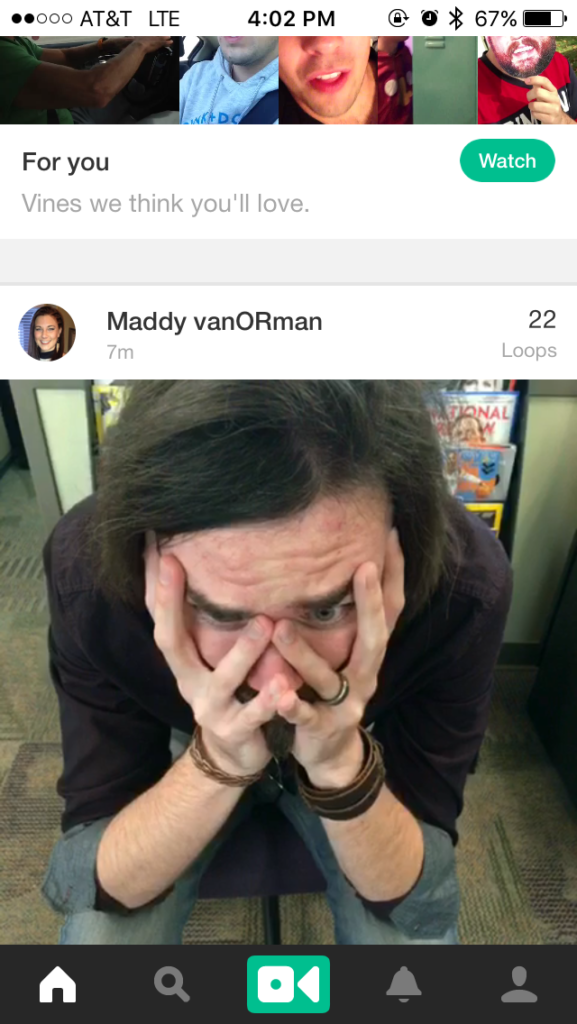Vine will be dead before the New Year. I’ve been listening to the first few bars of Wiz Khalifa’s “See You Again” on repeat and desperately choking back sobs every time I see a hoverboard. Suffice it to say, I’m not handling the news well.
As someone who can’t be bothered to even keep a Facebook account, I’m finding it difficult getting those who know me to understand why this matters to me at all. Let me explain.
Ever since my wife and I first began living together, we’d retire from our taxing days by flopping into bed and pulling up Vine’s comedy channel on her iPhone. It’s been free therapy for three years.
Only fellow viners will understand that personalities like Zach Piona, Landon Moss, Jesse Pomerico and Darius Benson were like long-distance friends. In a bizarre way, we felt like we knew them. We watched them grow, watched them become successful.
But when we played out this routine the night of Oct. 29, there it was: Brandon Calvillo’s farewell vine. Titled “The End,” it was a montage of the most influential cultural moments of which he was a part.
I’m not ashamed to admit that I took the news like that of a loved one’s terminal prognosis, and consistent with the distracted, frenetic medium itself, I experienced the spectrum of grief within the span of about an hour.
In fevered denial, I started scrolling through the content of those resolute few who committed to post until the very end. I avoided any video with #RIPVine in the caption like the plague, deluding myself that some Kickstarter messiah would come along and save it in some deus ex machina miracle.
Well, my wine is still water, and my Vine is still damned.
I was furious. Twitter simply threw the kill switch on what had become a culturally significant international community — a democratized platform for artists to express their brands of pop-culture genius, as politically significant as it was culturally (e.g., the moment-to-moment, frontline documentation of Ferguson riots).
But all that anger was futile. This dynamic, high-energy culture catalyst that meant laughter, inspiration and connection to over 100 million active members didn’t mean anything when Twitter’s higher-ups discovered the app’s lack of sustained profitability.
As The Verge reported, “Interviews with seven former executives reveal a portrait of a company whose cultural impact far outstripped its strategic benefits to Twitter.” The decision was financial. A couple years of poor leadership and lack of vision made Vine dead weight chained to Twitter’s flagship app, which was taking on water already.
But why, God, why must Vine have been given a death sentence while culturally forgotten social media relics are still accessible? When this tragedy began to unfold back in May, The Atlantic observed that “Cultural death and actual nonexistence aren’t mutually exclusive in the world of social media.” Myspace still exists, albeit like a corpse in a Sulawesi living room — everyone knows it’s dead, but it’s still around.
But Vine wasn’t even terminal, evidenced by the heart-wrenching flood of farewell videos from the app’s most influential personalities, all of which shared the mantra, “This platform changed my life,” a sentiment echoed in Vine founder Rus Yusupov’s recent tweet: “Don’t sell your company!”
I’ve tried to make peace with it, but the reality is that while viners haven’t altogether gone away—merely experienced a diaspora to other platforms—the cultural mosaic to which each member contributed has been shattered. It’s the community that will be sorely missed.
For hundreds of millions of viners, this is the end of an era. The app wasn’t ever going to change the world, but it was so much more than a social video platform to the community that loved it. By early next year, though, there will be a void — a void that I’ll be left to fill with FailArmy compilations of parkour enthusiasts taking diggers off four-story buildings.




















